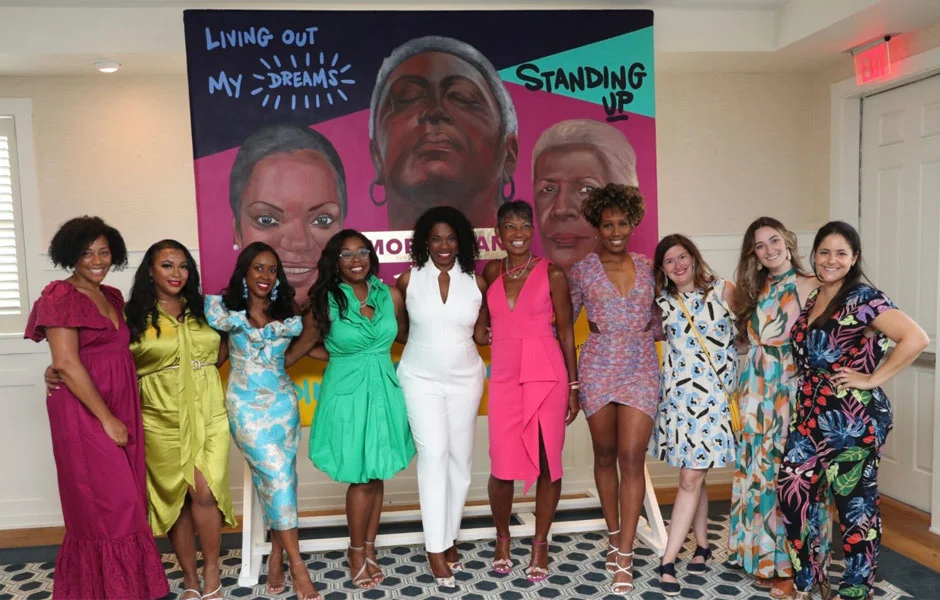Reshema Kemps-Polanco, Executive Vice President and US Head, Novartis Oncology, talks to GOLD about her journey from army cadet to pharma leader, her passion for making a difference and how she believes diversity can be improved internally and externally in pharma
Words by Isabel O’Brien
Reshema Kemps-Polanco starts each morning with purpose, whether it’s a quick ride on the Peloton or taking a simple moment in nature. She likes to centre herself before addressing the day ahead.
This pharma leader is responsible for all of the Novartis commercial and medical oncology operations in the US, but is also a “mom, wife and a CEO of the household”. Work-life balance is important to Kemps-Polanco, but she wouldn’t necessarily call it that. “I’ve moved away from the word balance because I feel like it is a goal that constantly evades me,” she observes as she laughs. Instead, she prefers a strategy of “integration”, and she encourages her teams to also find what works best for them. “It’s not cookie cutter,” she maintains. “It is not one-size-fits-all.” And she is certainly a passionate advocate for diversity in all its facets, whether that’s in her work-life integration, within her teams, clinical trials or the pharmaceutical industry as a whole.
The idea that you can extend life, impact cure rates or improve the quality of life – that’s something worth getting out of bed for
Kemps-Polanco’s daily schedule is notoriously meeting-heavy, but she has worked hard to establish a healthy rhythm with her team that enables them to thrive on both individual and collaborative levels. When asked what her favourite thing is about her job, she is resolute in her response. “Impacting patient survival – I feel incredibly blessed and grateful to have this responsibility to do this work,” she explains. “The idea that you can extend life, impact cure rates or improve the quality of life – that’s something worth getting out of bed for.”
Can you tell us about the early origins of your career, especially your time in social work and the US Army?
My undergraduate degree was in social work, but I started off in finance and commercial banking. My mother felt, from a practical standpoint, it could take me to really great places, but it wasn’t my route – it wasn’t my purpose. I am really drawn to service, being a problem solver, making a difference and having an impact. I knew that I wanted to have a life of significance versus success, so I was drawn to social work and to healthcare.
I was raised by a single mom, a very strong amazing woman, who is my role model
The experience I had in the army was interesting because all of these things intercepted there. When I was in high school, the army recruiters came in and I wasn’t going to do it. Then I took the test and my scores came back, and I decided I would. I saw the army as path – one to service, and two to help pay for college. I was raised by a single mom, a very strong amazing woman, who is my role model. So, I saw it as a way for me to help the family. Little did I know what I would learn in that experience. I left as an immature kid, and I came back as an adult. And I took my college experience very, very seriously after that.
What sparked your decision to join the pharmaceutical industry?
My first job out of undergraduate education was as a long-term care social worker, and I absolutely loved it. Ironically, this is where I first learned about Novartis through their Patient Assistance Program. It was a sweet spot for me as I could connect with physicians, families and patients by assisting patients in acquiring certain medicines. Then the physicians I worked with said, ‘listen, you’ve got a lot of potential and you’re great at what you do, but what about joining the pharmaceutical industry?’ And I thought, let me learn more about it. Then I started applying, and Novartis called me. Obviously, I was already biased towards the company, so I went through the interview process, then earned a role as a pharma sales representative. I was born and raised in Louisiana, by the way, so this all happened in Louisiana. I then had the opportunity to move to the home office in New Jersey. And from there, the story evolves.
Since joining pharma, you’ve largely worked in oncology. Can you tell us about a significant challenge in the field you’re passionate about tackling?
There is a huge momentum to accelerate clinical trial recruitment. When we look at what happened during the pandemic, some people suffered more so than others. And it’s hard to compare degrees of suffering, but the disproportionate suffering in certain ethnicities, racial groups and communities was really exposed. So, I’m committed to improving diversity in clinical trials. The root causes of this are well-documented, such as lack of education about clinical trials and clinical trials not being offered to certain patients because of a belief or bias that patients wouldn’t or couldn’t compliantly participate.
I’m committed to improving diversity in clinical trials
Then also, COVID-19 has really impaired our healthcare system; we are still having talent and staffing issues, but we also need to accelerate the expansion of clinical trials into the community. The vast amount of research happening focuses on those metastatic stages of cancer and overall survival rate, but the earlier you can detect and treat, the best chance for cure and longer survival. A lot of those patients will be found in the community setting, not necessarily in academic centres and NCI-Designated Cancer Centers. There are several root causes and barriers that need to be solved. The bottom line is multifactorial, and it’s going to take more than one entity to solve it.
What was your experience of rising the ranks in the pharma industry as a woman of colour, and do you think the culture is changing?
I am certain that it is changing, but I do not think it’s changing fast enough. If I were to think about my own career and the linchpin of my success, it was sponsorship. Not one, but multiple sponsors allowed me to have the opportunity to demonstrate my capabilities and potential. The sponsor can’t do the work for you; they can’t make you any more capable, but they can take their own spotlight and shine it on the sponsored individual. But what about for those who do not have sponsorship – how many talented individuals are we leaving behind? In a recent LinkedIn post, I highlighted that just 5% of up-and-coming Black employees succeed in winning sponsorship, compared to 20% of White employees. Now, none of these numbers are great. We have to get better overall, but you can see the gap. If we could close the gap between the 5% and 20%, we could really see an increase in diverse leadership throughout the ranks.

With great success can often come failure. What is your philosophy towards failure?
I’ve adapted Nelson Mandela’s philosophy towards failure and that is: I never lose – I win or I learn. As long as I’m winning or I’m learning, it’s okay. And if you think about the pharmaceutical industry, think about how many shots on goal we have to make to get a success – you have to be okay with iteration.
I do not call it failure because from every failure you have the second iteration, which is your improvement upon it
I do not call it failure because from every failure you have the second iteration, which is your improvement upon it – I think of myself as a curious continual learner and part of our organisational culture is to be a learning organisation. And I think there is always an opportunity to ask how do we accelerate learning? Often, it can feel very hard to succeed when you are pursuing something meaningful and we don’t always get it right the first time, but when you finally do, it can be a huge win for patients and society.
What, in your opinion, are the most important qualities of a leader today?
I would start with being purpose driven and understanding your ‘why’. Is your why for yourself? Or is your why for others? That’s one. Then being bold, disruptive and a change agent. Don’t be afraid to take a bet as that could be life-changing for patients and their families. The third is having a strong network of truth tellers around you, whether that’s to tell you about the business, tell others about your leadership or tell you about how you’re integrating your life.
You can be the best leader, but your personal life could be suffering. So, having someone who can see when you’re pulling too much in one direction is essential. I don’t tend to hire wilting flowers. I like to debate our options so that we get to the right solutions. I tend to hire courageous people who will look me in the eye and not be afraid to say: that’s not right and here’s why. I think that’s very important if we are going to do and be our best for the cancer patients we serve.









